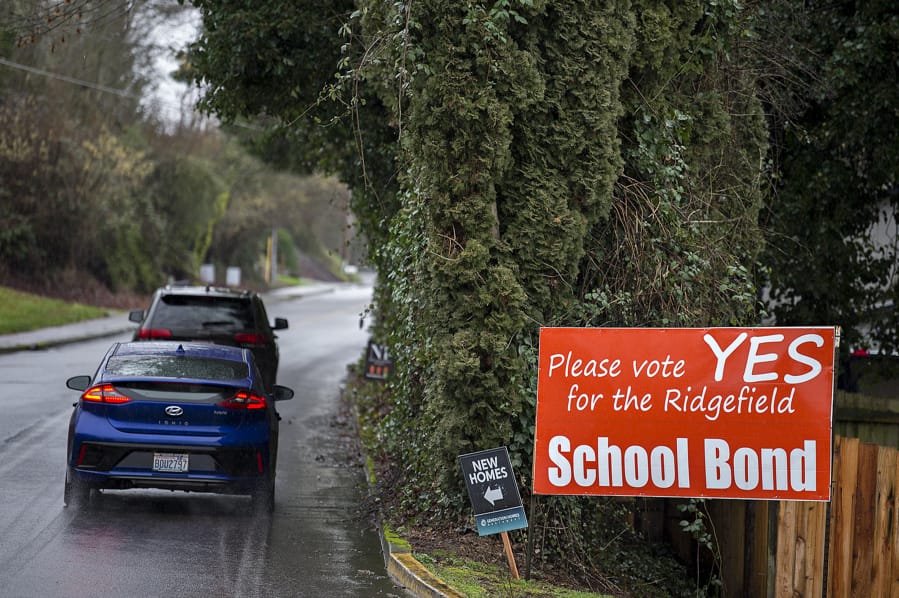OLYMPIA — During the 2023 election cycle in Washington, 20 school bond measures went on ballots in local elections. Of them, only two met the 60% threshold of votes needed to pass. Another six failed bonds pulled in at least 55% of the vote. Eight more that failed were supported by at least 50% of voters.
Washington is one of 11 states in the country that require a threshold of votes greater than 50% — also called a supermajority — to pass school bonds. This is more than the simple majority threshold of 50% needed to be elected governor or to a city council.
A proposed amendment to the state’s constitution would lower that 60% school bond threshold to 55%. For years, some Democrats have wanted the number dropped down to 50%.
Last year, a Republican lawmaker met them in the middle with the 55% offer. That bill didn’t make it through to the end, and it is on the table again this session. Rep. Paul Harris, R-Vancouver, is the prime sponsor on that bill.
On Monday, Harris joined lawmakers and educators to testify about the proposed law change in front of the state House Education Committee in Olympia.
“The Evergreen School Board passed in 2018 a $695 million bond. We have beautiful schools in the Evergreen School District. Impeccable,” Harris said. “(Stevenson-Carson School District) still has lead-based paint in their schools, they have a heating system that doesn’t work, and they have no air conditioning. The disparity is huge.”
House Committee member Rep. Travis Couture, R-Allyn, asked Harris if he believes lowering the school bond passage threshold to 55% might lead to things getting out of hand.
“With more of a capacity to pass bonds,” Couture said, “are you afraid that some of these project scopes will explode? You know, instead of just building a nice school, now I’m going to build the Taj Mahal of schools?”
Harris isn’t worried about that.
“I would look at all of it and say, ‘Who really gains from this?’ It’s probably our smaller school districts,” Harris said. “… Our areas — Republican areas — they need schools. I’m sorry, Stevenson needs a school, desperately. Do I think they’re going to build the Taj Mahal? Heavens, no. I think what they’re going to build is a very economical school that will meet their needs.”
Rep. Monica Stonier, D-Vancouver, co-sponsored Harris’ proposed bill and also spoke at Monday’s committee hearing. Stonier, a teacher, has led the push to lower the school bond passage threshold for years. The state representative was disappointed the committee wasn’t discussing a 50% majority bill Monday, but the 55% proposal still has her full support.
“I became a teacher because I believe that public education is the equalizer of inequities in our system and in our society, and the way to make sure every child has an opportunity to have the strongest footing possible,” Stonier said. “We don’t have that if they don’t have equitable access to learning environments that allow them to care more about their math lesson than whether or not there’s something falling through the roof.”
Michelle Nims, a former president of Washington state Parent-Teacher Association, told the committee that her organization has supported lowering the school bond threshold every time it’s been a topic of conversation in the Legislature.
“A minority of voters is being allowed to prevent school districts from addressing student safety, overcrowding, improving indoor air quality, updating heating and cooling systems to address extreme temperature fluctuations, ADA compliance, aging buildings, seismic safety, and other important building updates and maintenance,” Nims said.
Liv Finna, director for education at Washington Policy Center, spoke Monday in opposition of lowering the threshold.
“Our research shows that this bill and the House joint resolution would make it much easier to increase people’s property taxes by large amounts for 20 to 30 years, and for this reason, is bad policy for the taxpayers of this state,” Finna said.
Although the bill has support across the aisle; some Republicans have spoken out against the proposed lowered threshold.
Last week, Senate Minority Leader John Braun, R-Centralia, said he finds the current supermajority threshold reasonable for school bonds.
“We’re asking voters to pay for a school bond for 20 to 30 years,” Braun said. “It’s a long-term commitment. … The answer is not to change the standard. The answer is to build a better case for the voters.”
Rep. Sharon Tomiko Santos, D-Seattle, chairs the House Education Committee. While overseeing Monday’s meeting, she pointed out that Washington state funds 71% of its public schools’ budgets, while New York state funds 39%.
“Washington state is one of the states that funds schools at the highest level and is the least reliant on local taxation,” Tomiko Santos said. “I think that is the part of the topic that I hear this bill raising.”



